You read blogs (or at least you’ve now read this blog, so you know what a blog is). Enter: the history of blogging.
You probably know of other popular blogs you’ve read that cover topics you’re interested in, and I’m guessing you’ve either managed your own—or at least considered starting a blog at some point.
But do you know the history of blogging? It’s actually a fascinating journey how we’ve gotten to this point in the world of blogging in 2024.
Blogging can trace its humble beginnings back to the year 1993. For context here are a few things that also happened during that same year blogging first started:
- Bill Clinton became President of the United States
- Czechoslovakia ceased to exist and became the Czech Republic & Slovakia
- NAFTA was passed in the US, Canada and Mexico
- Famous pop singer Ariana Grande was born
- South Africa’s constitution was approved
Blogging has been around—and played a role throughout our collective digital history for the last 30 years. We’re going to talk about the people, places, major events and (at times) tumultuous changes that’ve made the blogging world what it is today.
The History of Blogging: How Blogging Has Evolved (1993 to 2024)
- 1993: Blogging Officially Begins
- 1994: Justin Hall Begins Personal Blogging
- 1997: The Term “Weblog” is Coined
- 1998: The First Blogging Platform (Open Diary) Launches
- 1999: Blogger and LiveJournal Launch (with Xanga Soon Following)
- 2003: WordPress and TypePad are Created
- 2003: Google Buys Blogger and Launches AdSense
- 2004: “Blog” Becomes the Dictionary Word of the Year
- 2005: Vlogging (Video Blogging) Emerges as YouTube Launches
- 2006: HuffPo and Buzzfeed Combine News and Blogging
- 2007: Microblogging Becomes a Trend
- 2012: Medium is Founded (as a Free Blogging Platform)
- 2016: WordPress Launches the .blog Domain Extension
- 2024: There are Over 31.7 Million Bloggers in the U.S.
Disclosure: Please note that some of the links below are affiliate links and at no additional cost to you, I’ll earn a commission. Know that I only recommend products and services I’ve personally used and stand behind. When you use one of my affiliate links, the company compensates me, which helps me run this blog and keep all of my in-depth content free of charge for readers (like you).
And since understanding the past can often be the key to finding success in the present, we’re going to take a trip down memory lane as we meander through the history of blogging. And head over here if you want to see some successful blog examples today.
Want my Free Guide: How to Start a Profitable Blog?
Come read my guide to starting a blog that’s been featured on Forbes, Business Insider and Entrepreneur.
Now, let’s dive into the history of blogging!
1993: Blogging Officially Begins

Right around the time Bill Clinton was being inaugurated as the President of the United States and Beanie Babies were making their debut, Rob Palmer, the self-described world’s first blogger and digital nomad, started what was essentially a blog for a communications company he’d been hired by in London.
When was the first blog started? In 1993 by Rob Palmer.
Side note: There are actually multiple competing claims about who the world’s first blogger is, so it’s a matter of dispute and likely impossible to conclusively verify.
Either way, this first or very early online journal (aka blog) was only made up of plain text—there were no graphics or fancy formatting, but this very first incarnation of a blog did something important. It had the ability to spread ideas.
This blog, which is quite possible the world’s first, showed that the Internet was teeming with potential. You can hear all about the world’s first blog by listening to my interview with Rob from earlier this year. It’s quite an interesting tale of what it was like learning how to make a website in those early days.
1994: The Founding Father of Personal Bloggers Starts (Over)Sharing
In 1994, then 19-year-old Justin Hall began sharing the dirty details of his personal life on his website, Justin’s Links From the Underground.
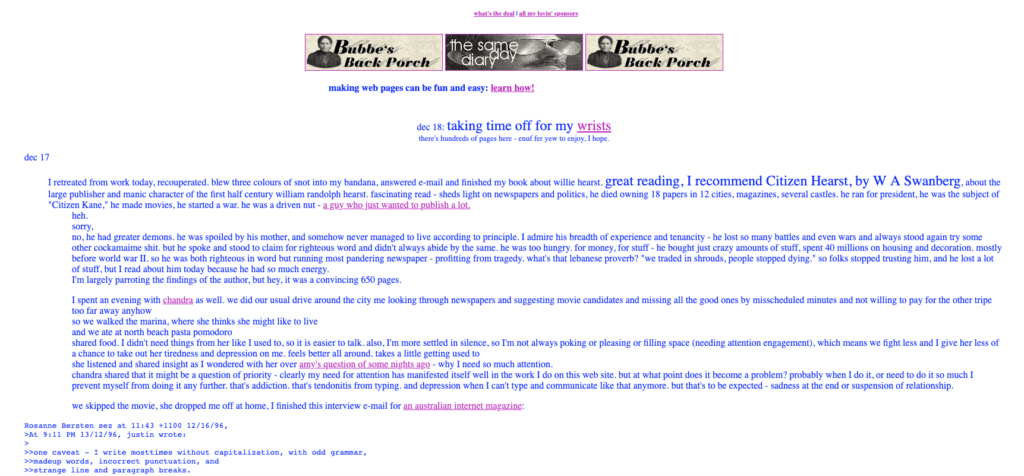
Of course, at this time, it wasn’t called a blog at all. His website mostly consisted of a list of links (hence the name) with some intermittent text woven in throughout. You can learn more about his story by watching his film, overshare.
It wasn’t actually until ten years after his Internet debut, that the New York Times dubbed Hall the “founding father of personal bloggers.”
1997: The Term “Weblog” is Coined
Believe it or not, the word “blog” actually has a very logical origin.
What’s the origin of the word blog? While most people call it a blog, the term is short for weblog. A weblog is a log—or written documentation—that’s published on the World Wide Web. Put those two ideas together, and you get the term weblog.
Early American blogger, Jorn Barger, is credited as the person who came up with the word. Prior to that, people called blogs things like “online journals” or “online diaries.” The term “weblog” has a certain brevity and charm to it, and it wasn’t long before it became shortened even further to “blog.” Read even more in my article about What is a Blog?
1998: The First Blogging Platform (Open Diary) Launches
Now that there was a term for writing out your thoughts and sharing it with the world online, developers began to take notice and started creating platforms that were designed to allow everyday Internet users the ability to broadcast their own weblogs.
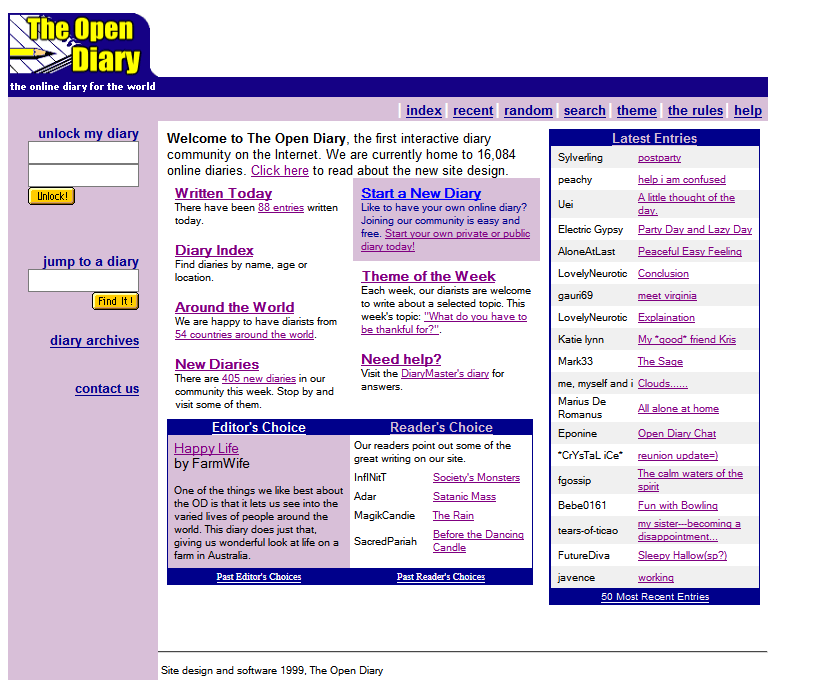
A vital component of the history of blogging, Open Diary, debuted in 1998 as a blogging platform that not only provided space for users to blog, but also a space for members to comment on one another’s posts.
It was also right around this time that the word “weblog” became too cumbersome and the shortened and more modern slang term, “blog,” began to proliferate.
From this point forward, this vernacular would remain the same.
1999: Competition Emerges with Blogger and LiveJournal Launching
The turn of the century was almost here. Adults were worried about an upcoming potential disaster called Y2K (spoiler alert: nothing happened) and kids were catching them all with the latest craze, Pokemon.
In the blogging world, things were humming along smoothly as more blogging platforms started to emerge in the mass market.
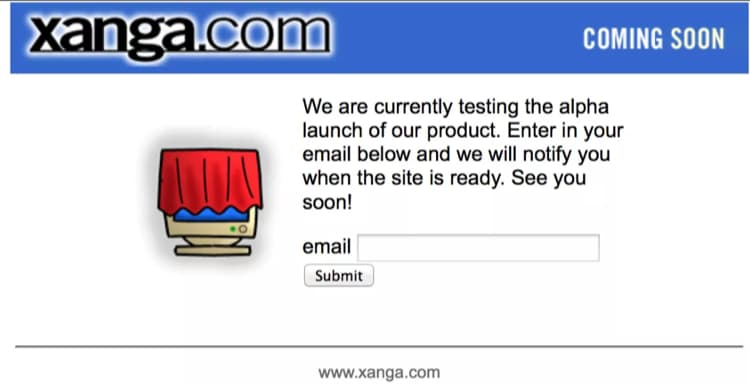
In 1999, LiveJournal and Blogger both scrambled onto the scene, followed by Xanga (formerly a social networking site similar to the better-known MySpace, which wouldn’t emerge for several more years) in the year 2000.
2003: WordPress and TypePad Enter the Scene
Today, over one-third of websites (including my blog here) run on WordPress.
And looking at how beautiful the product is today, it’s almost hard to believe their content management system (CMS) started out looking like this:
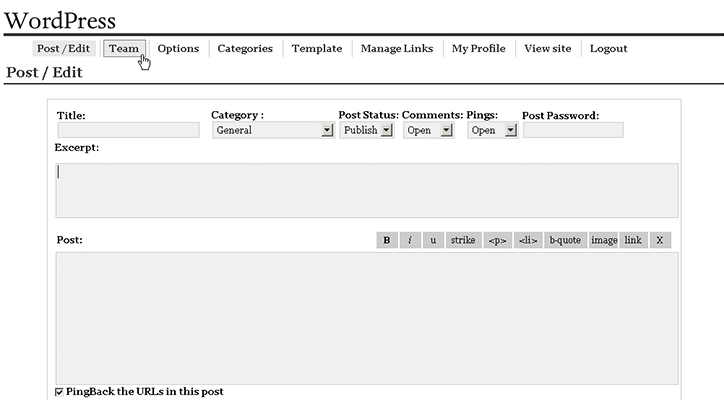
WordPress got its start in 2003, when college student Matt Mullenweg and his friend, Mike Little, had an idea that blossomed into what would eventually become the most popular content management system (CMS) in the world.
What year was WordPress created? In 2003 by then college students Matt Mullenweg and Mike Little.
Later that same year, TypePad, another less-technical blogging platform was introduced and continued pushing the boundaries on how to make blogging a more accessible activity for people who didn’t know how to write their own code.
This is also around the time when a lot of today’s top hosting companies started jumping onto the scene and offering what’s gradually evolved into the best web hosting plans for bloggers to choose from even to this day.
2003: Google Buys Blogger and Launches AdSense
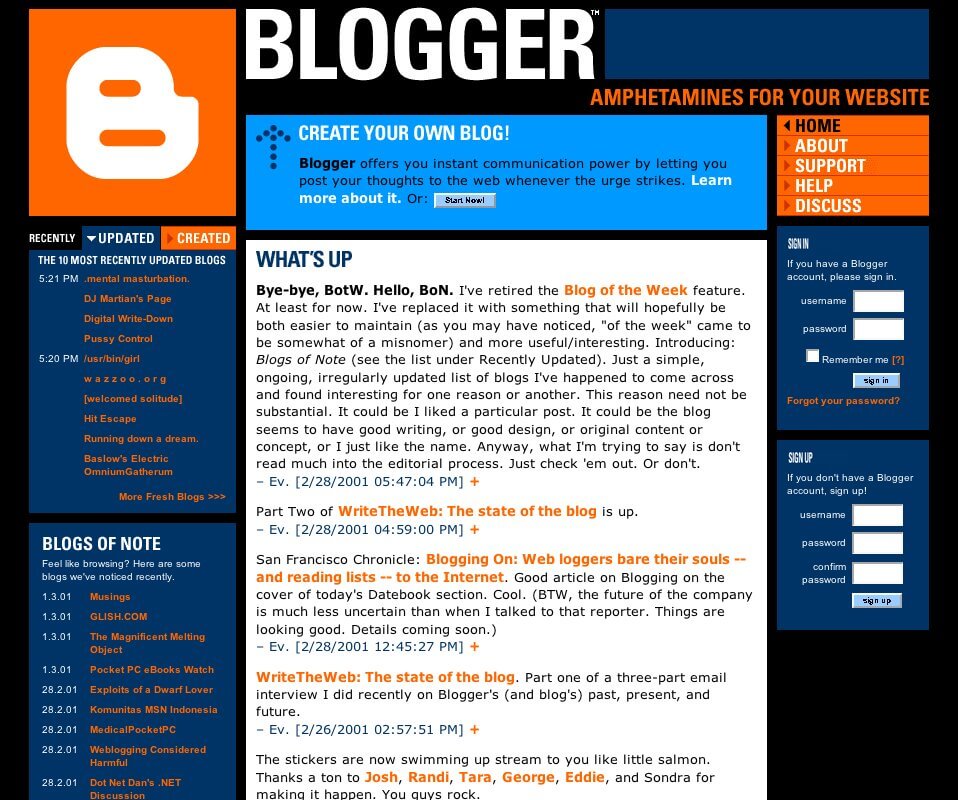
The year 2003 was a busy one in the history of blogging.
During that same year, Google purchased one of the largest blogging platforms, Blogger. At that point in time, Google was still fighting hard to climb the ladder of becoming the most popular search engine in the world. And buying up all of those blogs allowed the company to glean more data than ever before—which drastically improved the quality of their growing search engine.
At the same time as they were buying up popular blogging platforms, Google was also working on and launching two of their flagship products, AdSense and AdWords.
These are the products that, among other things, allow people to monetize their blogs through advertisements from relevant products and services, which is a big step in altering the course of the history of blogging.
If you’ve seen ads for everything from shoes to laundry detergent, and your dream car floating around on the blogs you read, then you know who you’ve got to thank.
Wondering how you can drive more traffic to your site to make money with your blog? Check out my guides on how to do exactly that:
- How to Start a Blog (and Make Money) This Year
- 32 Proven Ways to Drive Traffic to Your Blog (Today)
- How to Make Money Blogging on the Side of Your Day Job
Want my Free Guide: How to Start a Profitable Blog?
Come read my guide to starting a blog that’s been featured on Forbes, Business Insider and Entrepreneur.
2004: “Blog” Becomes the Word of the Year
Every year since 2003, Merriam-Webster has published a list of words that seem particularly relevant to the year in question. Recent words of the year lately have included “justice,” “feminism,” and “surreal.”
In 2004, however, the most looked-up word of the year on the Merriam-Webster online dictionary was “blog.”

This is significant, because it showed how much blogging was impacting the mainstream world.
Rather than automatically tuning in to news stations or opening a newspaper, Americans were beginning to turn to their favorite blogs for the content (and even news updates) they were craving.
As we all know now, this has ended in pretty mixed results. A lot of important news that doesn’t make it to the mainstream outlets can be distributed through blogs (and on Twitter), but so can a lot of fake and potentially damaging, misleading news.
2005: Vlogging Happened (YouTube Launches)
In 2005, YouTube officially launched, and while it didn’t happen right away, the platform set the stage for what would become modern vlogging.
What is a vlog? A video-based blog.

At the same time, the Yahoo! Videoblogging Group saw an increase in their membership. In short, this is the year that a new way to express yourself online was truly born.
Some of the early vloggers who are still popular today include Smosh and Michelle Phan.
2006: HuffPo and BuzzFeed Blur the Lines Between Blogs and News
While some had been looking at blogs and taking them as seriously as they the largest news outlets for years by this point, 2006 brought a new age with the launches of Huffington Post and BuzzFeed.
What, really, is the difference between a blog and a news site? These platforms had the look and feel of a mainstream news site, but glancing through some of the “articles,” many were written as editorial content, fun listicles and explorations into other creative blog post ideas writers wanted to try out with their growing blog audiences. These sites also mastered the art of teaching their journalists how to write a headline that’s designed to capture reader attention.
The side effect is that the distinction between fact and opinion became more blurred after this point, which is a trend that’s continued today in some corners of the Internet.
2007: Microblogging Becomes a Thing
In late 2006, ProBlogger’s Darren Rowse suggested to his readers that they keep their blog post length short enough to allow the average reader to get through it in about a minute and a half. It was also around this time that a little known blogger, Tim Ferriss started his blog to drum up press for his upcoming book, The 4-Hour Workweek.
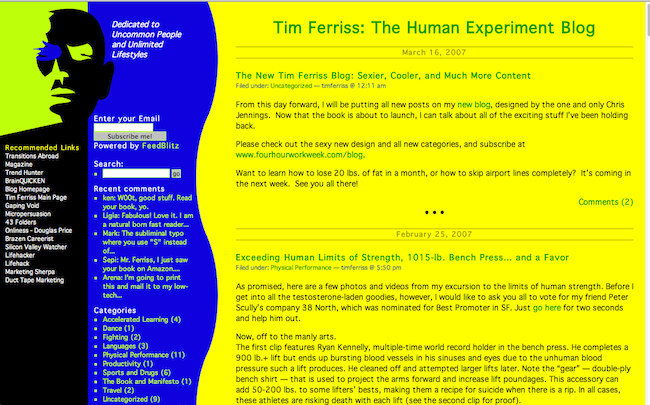
If the average person reads 200 or 250 words per minute, this would mean that the ideal blog post during this period of time may have been somewhere between 300 and 400 words. That’s pretty short by today’s standards. But, if short was good, then ultra-short must have been better, right?
A new era in the history of blogging, called microblogging, had begun.
At this point, Twitter (then called Twttr) had been humming along for about a year, but it finally took off and became explosively popular in 2007. How much could you really say in 140 characters, (which was the limit at the time)? Enough, apparently, because the site is still wildly successful over a decade later.
2012: Medium is Founded
In 2012, while you were learning the dance to Gangnam Style, Medium was launching.

This online publishing platform (that now has some paywalled content), was wide open to all for the first few years of its life. There are both professional and amateur writers publishing their blog posts on Medium, and similar to BuzzFeed and HuffPo, it tends to blur the line between news and opinion.
Medium gave yet another outlet to social journalists who wanted to make their mark, find a target audience online and grow their communities.
2016: WordPress Launches the .blog Domain
Blogging had become so popular by 2016, that WordPress decided to add the domain extension .blog to its list of possible blog URLs.
This meant that in addition to the original six (at the time) domain extensions in popular use, which included .com, .net, and .org, people and organizations could now choose a domain name with the .blog extension.
This move opened up many new domain options and highlighted the popularity of blogging.
2024: There are Over 31.7 Million Bloggers in the U.S. Alone
The history of blogging will never be over… and even better, you can still become a part of it (along with 31.7 Million+ other bloggers in the U.S. alone).
Whether you’re brand new at blogging or you’ve been trying your hand at it for a while and just haven’t quite gotten to where you want to be, I’ve compiled my ultimate guide to starting a blog as a completely free resource that’ll help achieve your goals when it comes to making money with your blog this year—whether from landing some paid blogging jobs or by selling your own products (like writing an eBook, creating your own blogging courses or selling blogging books to an audience eager to learn your craft).
My guide will teach you everything from how to write a blog post, to creatively naming a blog, choosing the right monthly hosting plan for your blog, implementing intelligent blog SEO strategies and more.
Don’t let another year go by without staking out your own corner in the history of blogging.
Try My Free Keyword Research Tool
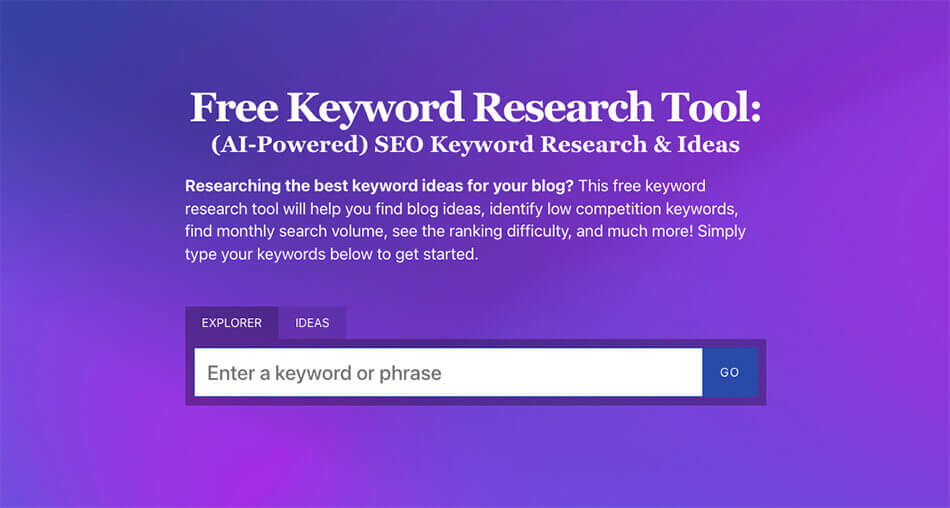
Try my free AI-Powered Keyword Tool to get dozens of research-backed ideas for keywords & topics to write about on your blog today.

I read something about how blogging came about while back and was amazed how much it evolved to today. There was no such thing as affiliate marketing and blog monetization back then. When I officially got started on the Internet back in 1999, the only thing I knew was Tripod, FortuneCity, Netscape, logging onto the Internet using Yahoo!, Excite.com, or the free AOL 56K dial-up CD-ROM Internet connection.
One thing for sure is that I’m glad I know about blogging today. In fact, it was back in 2005 when I accidentally stumbled upon affiliate marketing that I started my first free blog on Google’s Blogger.com. I had no clue what HTML and a blog was. Nor did I know what affiliate marketing was nor how to promote affiliate programs on a blog to make money online.
Experimenting with what was called “affiliate links,” I managed to successfully join the Walmart affiliate program back in 2005 which was my first official affiliate program and placed Walmart affiliate links on a blogger blog. I didn’t know what content marketing was back then. Nor did I know that what you write and publish to a blog gets indexed by search engines.
As I started experimenting with writing and publishing blogs back then with Walmart affiliate advertisements on it, someone came either from a search engine war somewhere across the Internet and found my blog, clicked the Walmart ad, and made a purchase. If I can recall clearly, I got a check from an affiliate marketing network back in for a little over $70. It was from there and making money from the eBaY affiliate program back in the day that I totally got hold on blogging and affiliate marketing.
While growth was challenging in the beginning stages of this so-called side hustle affiliate marketing career, I can surely say I learned a whole lot and feel appreciative of being among online marketing elites such as yourself and the side hustle millionaire status to look forward to in the near future.
I’m glad you keep discussing the topic of blogging and side hustling he cause it helps me to stay focused and is encouraging as my online revenue potential increases. Thank you my friend. 🙂
Ha! That’s an awesome story, thanks for sharing 💪
Here’s a fun thought experiment… watching the ways blogging has changed in 26 years, can you even imagine where things will be in another 5… 10… 25 years? It’s going to be fun to play a part in shaping future.
Ambitious side hustle bloggers are going to end up side hustle millionaires “faster than Flash Gordon and more entertaining than Ed Norton” in the next 5 to 10 years, as affiliate marketing and blogging-side hustling continues to positively evolve. I know that much! 🙂
Hey Ryan, this is an excellent post! It seems that you have put lots of time to get this information handy and shared here. Thanks for detailing the history of blogging from 1993 to till 2020. Keep sharing!
Yes! It was a fun history to research and compile though, I really enjoyed this one 🙂
Haha pretty cool overview, Ryan! I first came online in 2004, playing counter-strike and I had no clue what blogs were back then.
As I remember it, private forums and MSN messenger was the thing back then. Looking through the article, it seems like the mid-2000s was when blogging got the biggest boost since it looks like its was around that time Adsense and affiliate marketing launched and so I imagine people experienced the power of making the first money.
I’d be curious to hear from someone who I was older back then 🙂
Haha I’m with you on that! I remember the days of spending countless hours playing CS back in 2004 too 😂
Yeah, blogging didn’t really take off as a more clear “business” format for sizable numbers of people in the mid to late 2000s… and even then, you see people like Tim Ferriss emerge that used blogs primarily as a vehicle to sell books, book paid speaking gigs, promote their existing businesses. Blogging has really grown into it’s own within the past 10 years from the perspective of having fully digital businesses that are supported by things like sponsored content, affiliate revenue, digital product sales and the like.
I want to work with you. How can I help you from India Jammu and Kashmir.
Hey Abdul! Check out my contact page for more info here: https://www.ryrob.com/contact/
Excellent article, thanks Ryan. I’ll be suggesting this to others.
Thanks so much, Nafis!
It’s pretty cool to see how much blogging has grown in the twenty seven years it’s been a thing. As well as how many more platforms there are today than even a decade ago. Thank you for the perspective, it’s good to see where we’ve been.
Absolutely! It’s pretty much always changing. You’re welcome, Bret!
Thank you for providing such a great detail of blogging history!
You’re welcome! 🙂
Hello Ryan, this was a good Article to read. It was very interesting to see the way blogging has evolved. Thank you for allowing me to learn so much in a short span of time.
Love to hear it, Zach! Thanks for the kind words.
This was a very meaningful post, so informative and encouraging information, Thank you for this post.
You’re welcome!
I like this post…. Well done
Thanks 🙂
I am currently working on a book about blogs and I need the history of blogging. Is it possible to use your article? It would help me a lot. Much appreciated, your help
Sure! You can cite my article and pull from it, please just reference it as your source material 🙏
Thanks so much..This will surely help me a lot.
🙌
I’M BATMAN!!!
Are you sure you’re not superman?
From:Chuck Darling
To Ryan Robinson
Re: What if the net fails ?
I wrote a text adventure writing
program, starting about 1996.
It creates a circularly linked list
of “blogs”
and writes adventures too !
It works online and offline.